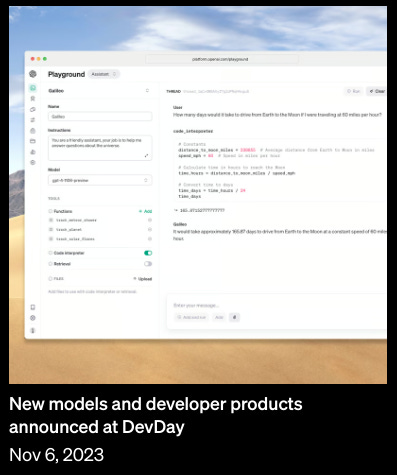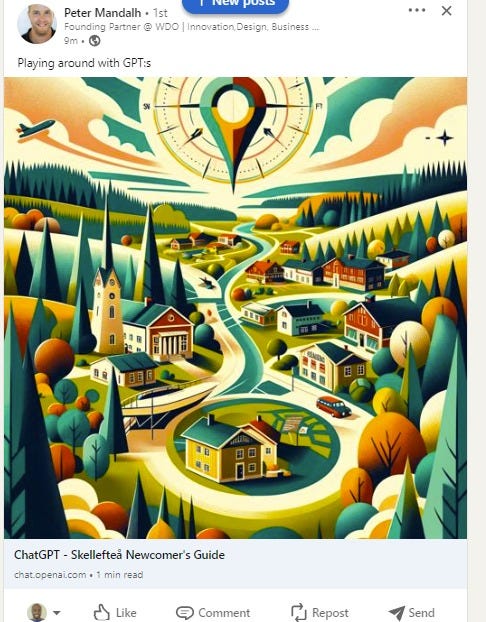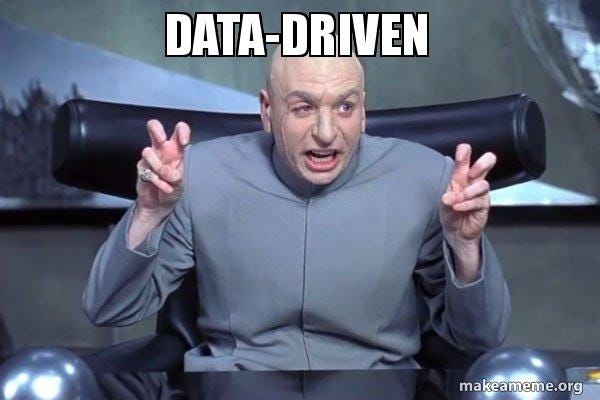Last week was OpenAI’s first-ever developer day.
The creators of ChatGPT, DALL-E etc. The reason Microsoft (who bought them) look so smug as they dangle Co-Pilot in front of their customers.
Now, if you’re a developer or an AI obsessive this was big news. Code Interpreter and GPTV via API, Context windows increasing to 128k, GPTs and assistant APIs.
For everyone else… lots of acronyms from Geeks at a convention.
We've pulled out the 3 big areas of promise we see for consultants. As well as the journey still required for these to become reality.
TL;DR… It’s big news. Just not quite yet.
1. Everyone can ‘do’ data
We all know that analysing both quant and qual data is a critical part of consulting projects.
But that doesn’t mean we all do it.
On every project, someone ends up being the spreadsheet person. Whether they like it or not.
There are a few reasons this happens.
Most often it’s because we always find something else we’d rather do than fiddle with data in a spreadsheet.
What OpenAI announced changes this. Technically at least.
It’s a huge step towards allowing you to:
Provide your dataset in any file format (notes, files, recordings etc.)
Write “What correlation is there between on-time delivery and customer retention?”
Get back a meaningful answer in the format you want. Think charts + written summaries + audio clips of the analysed data.
In short - ask more complex questions without needing to spend so much time priming the AI or perfecting your series of prompts.
In the background, the AI writes and runs code to do the analysis you want.
It uses a sandboxed environment to run Python code. That in vogue and easy-to-learn programming language used for data analysis, automation etc.
So now everyone can ask natural language questions of their wall of text.
You don’t need to work the data; you just need to know what you want to find out from your data.
Relevant announcements: Code Interpreter via API, Assistants API
2. Write up my workshop
Hands up - who likes writing up workshops?
I.e.,
Wade through a huge Miro/Mural board OR photos someone took of post-its.
Switch off the brain while your hands type up what was there.
Try and recall what someone meant by that 3-word post-it note that represented a 5-minute discussion.
Well, things are looking up for two reasons.
For those of you that don’t use the Post-It note app. Even if you do, it’s still a level-up. Upload your images and task the AI to write them up for you. At the very least you save on typing time.
Where things get interesting is you can combine your images with the recording/transcript of the workshop. I.e., Add critical context for the images and full traceability to what was said.
This is when a ‘write up my workshop’ button becomes truly possible.
Relevant announcements: GPTV via API, 128k context window, JSON mode, Assistants API
3. There’s a GPT for that
This one comes with two big caveats:
It only applies to non-confidential data. Unless your firm has an enterprise plan.
Your firm needs to allow access to ChatGPT. Which we know isn’t the case in several firms!
Those aside…
Anyone can now build a ChatGPT app for a specific purpose.
Tell the builder what you want i.e., what it does, tone to use, data to rely on etc.
Then release it into the marketplace, for your clients/ colleagues/ legions of fans.
Think…
Client onboarder - summarise all recent news about your client, and recent project updates, before you start the project.
Bitesize methods - step-by-step instructions for how to apply a new technique
A task you regularly have to do - Build your own and save yourself time.
Who will build the first 360feedback creator…
Relevant announcements: GPTs
Refining the shortcut
Marcus du Sautoy would liken this news to refining a shortcut.
The Oxford Professor and Mathematician describes a shortcut as "a clever path to the correct solution". GPT3 was a shortcut for written search and communication.
OpenAI are improving its shortcuts, and in turn the breadth of potential shortcuts.
Of course, at first, we will see a new wave of products and features based on OpenAI. As before, these will be more about the tech.
Generic, broad appeal, fun to try, hard to scale and adopt across your firm. Think macros, IFTTT etc.
View these as pathfinders and experiments to build familiarity. Catalysts for us humans to do what we do best; craft better shortcuts.
The best shortcuts take time to uncover but once revealed they become part of our repertoire for seeing the world. - Marcus du Sautoy
These will come as products that solve specific use cases and discrete problems.
For management consultants, these also need to build:
Trust that using a new app won't mess up their project.
Confidence to just start, and not wait for the "perfect" pilot opportunity.
Excitement, in every role (especially more senior) at how they then grow & achieve.
It's at that point… where it's adopted by all as a shortcut to delve deep and learn quicker... That the data-averse, spreadsheet victims and write-up warriors can start to rejoice!







